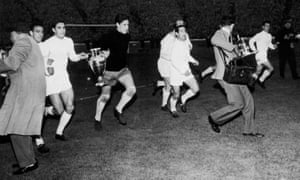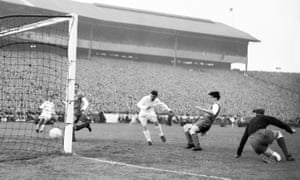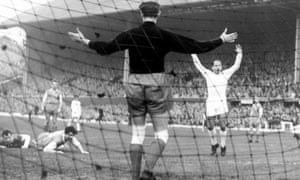[ad_1]
“The shirt must be there among my stuff somewhere, but what’s definitely there is the memory and that’s what makes me happiest,” says Pepe Santamaría. It was 60 years ago this Monday and he’s 90 now, but he can still see it clearly: all of them holed up in a hotel somewhere near the airport, sitting there virtually in silence, Santiago Bernabéu occasionally telling them to shush. And Bernabéu wasn’t a man you argued with. “There was orange juice and yellow biscuits and nothing else,” Santamaría recalls, still amused by the scene. “Nothing.”
And that was how Real Madrid celebrated arguably the greatest performance of all time, unfolding before 127,621 people but shared with just two security guards. Giants, Santamaría recalls. “They wouldn’t let us out, or go and have a drink or anything,” says the central defender they called The Wall. “Bernabéu wanted to ensure the team got back safe and sound.” When they did the following day, the full-back Marquitos disembarking the plane in full Highland dress, a fleet of white convertibles awaited them. In Puerta del Sol, the geographical heart of Spain, so did thousands of people. And there, Santamaría adds, “some were more prudent than others”.
“Real Madrid are expected to win the European Cup in their Association football match with Eintracht, the West German champions at Hampden Park tonight,” the Guardian’s short preview had run. “Since the competition has started they have proven too skilful for all comers.” But if a fifth consecutive victory had been anticipated, the way it arrived hadn’t – and Santamaría doesn’t agree that victory was a certainty. “The first thing that comes to mind when I think of that final was people saying our opponents were a young team and they were going to knock us out,” he says. “Fortunately, the game started with a defensive error and they scored.”
Fortunately? “Their goal was like a sting from a huge bee. Suddenly, you’re desperate, frantic, you’ve just got get that sting out quick. You react. And that’s what happened. They were shocked by it, taken aback. They didn’t know what to do and their level dropped. Our mentality was: ‘right, let’s go for them’. It was like Frankfurt had provoked us.”

The reaction was furious, the quality mesmerising. Within nine minutes, Madrid had equalised, within 12 they were in front and they weren’t going to stop there. WR Taylor wrote in the Guardian“[When] Puskas had a shot cleared off the line, the writing was on the wall with a vengeance; it merely remained to be seen how the execution would be carried out. Perhaps demoralised by some of the dummies sold to them by Alfredo Di Stéfano and Ferenc Puskas, Eintracht conceded two before the interval.”
Even in an absurdly talented team in which Santamaría insists “no one felt better than anyone else”, those two men stood out. That day, especially. Madrid’s outside right Darcy Silveira dos Santos, “Canário”, claimed that Di Stéfano was better than his international teammate Pelé. Di Stéfano described himself as a “withdrawn striker” and he played everywhere and did everything. Helenio Herrera famously claimed that if Pelé was the lead violinist, Di Stéfano was the entire orchestra.
Puskas was different. At least, he was by then. He had, by his own admission, been “fat” when he arrived at Madrid, but still no one struck a ball like the Hungarian with a heart of gold – “undisputed master of the arts,” according to the Guardian. “He didn’t have a foot, he had a hand,” Canário recalled. “That bugger played pregnant,” recalled Amancio Amaro, who joined soon after. “He was fat but he had a left foot that was prodigious. He only ever moved in a five-metre space but those five metres were golden.” In 39 European Cup games Puskas scored 35 goals.
Four of them came that day; alongside him, a hat-trick for Di Stéfano. 1-0 down, Madrid marched. It was 3-1, then 4-1, and 5-1 by the hour. There were still 20 minutes left when they scored the seventh. It finished 7-3. “The Scottish fans applauded us: they had watched a team that without cheating did something they hadn’t seen before. Lots of teams have marked an era but none won five in a row,” Santamaría says.

It helped that Madrid had avenged the team that defeated Rangers in the semi-final, but it was more about the performance, BBC’s commentator Kenneth Wolstenholme insisting “Real at Hampden in 1960 was by far the most delectable feast I ever described … they played as if touched by angels”. In the Guardian, Taylor wrote: “In the latter stages the Spanish side’s artistry was so immensely superior that its players gave the appearance of putting on an exhibition. Even Eintracht Frankfurt cannot really feel too badly about being defeated by such masters.” Hugh McIlvanney wrote of the “strange emotionalism that overcame the huge crowd.”
“Those folks certainly appreciated football,” Puskas recalled. “It was one of those blissful times when the whole team seemed to play brilliantly and we almost achieved some sort of footballing perfection.” Canário remembered a trip back to the stadium years later: “A man came running towards us. ‘Oooh,’ he said, ‘when you played, I was just a kid but that was amazing.’ It turned out he was the president of the Scottish FA.” Jimmy Greaves had watched on television and likened Madrid to something from another planet, leaving “us English blokes” thousands of light years behind.
“Well,” Santamaría says, when those eulogies are read to him, “we had a nice mix of European and South American football and that carried with it a surprise element: someone would put the ball between your legs or lift it over your head. We had players with that picaresque. It was a type of football they weren’t used to, they were seeing something different – especially in the north of Europe, where the football was more about strength and speed. They weren’t accustomed to that technical speed; it surprised them. Maybe that’s why they said things like that, which are very nice.”
“As the game went on, we weren’t really aware of the level we had reached; we only thought about winning,” Santamaría continues. “Afterwards we realised that we had marked an era in football, that we had done something that would be very hard to equal. Back then, I watched it two or three times. Not for myself but because there were people who hadn’t seen it who wanted to watch it with me. They’d heard about it.”

“I don’t know if it’s the best game we played and, who knows, one day there might be one better. Football has evolved for the better, 100%. There are great pitches, shirts that are light, a ball that’s easy to move: back then it would weigh two or three kilos more when it got wet. But, yes, we do still think of it as a great game.”
“I’ve kept a lot of things from that era, mementos; I’ll have to look through it all,” he adds. One thing he hasn’t got is the match ball. After all, two teammates had scored hat-tricks and wanted it too. And yet, nor have they.
“As the last moments of the match approached, Alfredo and I were playing ‘keep-ball’,” recalled Puskas. “We sometimes did this at the end of a match that we knew we’d won. It was a little game to see who would grab the ball at the end. I had glanced at the ref’s watch and I was counting the last minute in my head to make sure that the ball was at my feet when he blew the whistle. I’d scored the most so I figured if it was anyone’s, it was mine. But I knew Alfredo had hit a hat-trick and would grab it if he could.”
“The whistle blew, the ball was with me. I picked it up and was walking towards the centre-circle when [Erwin] Stein came over and asked for it. At first, I wasn’t having any of it but after the third time he asked me, I thought: ‘I really want this ball, but this guy has scored two and lost the match. It’s the least I can do’, so I gave it to him.”
Pepe Santamaría laughs. “Well,” he says, “you’re much nicer when you win .”
[ad_2]
Source link
